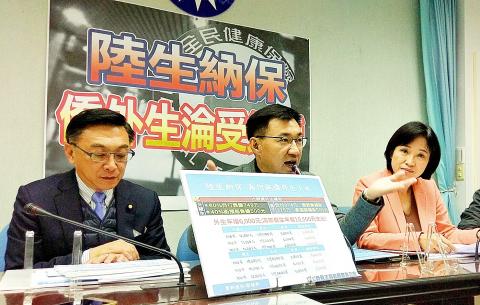The Chinese Nationalist Party (KMT) caucus yesterday said that overseas compatriot students and foreign students are the “collateral damage” of President Tsai Ing-wen’s (蔡英文) policy of including Chinese students in the National Health Insurance (NHI) system, as they will have to payer higher contributions.
The president announced the proposals in late October, which would see Chinese students covered by the NHI scheme, but paying full premiums. The bill also removes 40 percent government subsidies on NHI premiums that are currently enjoyed by overseas compatriot students and foreign students.
The legislature’s Social Welfare and Environmental Hygiene Committee discussed the amendment at a meeting yesterday.

Photo: Fang Pin-chao, Taipei Times
KMT caucus secretary-general Johnny Chiang (江啟臣) said the decision would mean that overseas compatriot and foreign students would have to pay at least NT$500 more per month for NHI coverage.
Under current rules, foreign students pay about NT$750 per month, while overseas compatriot students pay less, as they enjoy subsidies from the Overseas Community Affairs Council, Chiang said.
KMT Legislators Ko Chih-en (柯志恩) and Alicia Wang (王育敏) said that as a lot of overseas compatriot students and foreign students come from Southeast Asia, the new policy would be a slap in the face to the government’s “new southbound policy.”
Invited by the KMT to share his view, Huang Chen-feng (黃振峰), a foreign student from Malaysia studying at Soochow University, said he might stop studying in Taiwan if he is required to pay NT$6,000 more per year.
“I would hope that public hearings could be held before a final decision is made. I’m worried that this proposal would be railroaded through just like the labor law amendments were,” he said.
Chinese student Huang Luo yu (黃洛羽) said that as most Chinese students pay NT$500 per month for private insurance, he did not “see why we have to join the NHI if it is much more expensive.”
“Chinese students cannot even take part-time jobs here,” she said, adding that Taiwan has always been known as a place of friendliness and respect to human rights and she would hate to see that image fade among Chinese students.
Lin Nan (林楠), another Chinese student invited by the KMT caucus to the press conference, said he wondered why “Tsai Ing-wen displeases a group of people whenever she undertakes a reform.”
“It is OK if we do not benefit from subsidies, but a lower premium rate, befitting policyholders our age [who are less likely to use medical resources], would be better,” he said.
“No one has helped us understand the difference between the NHI and private insurance. The Mainland Affairs Council has not much to do right now, so it could tour schools to discuss the issue,” Lin said.

Alain Robert, known as the "French Spider-Man," praised Alex Honnold as exceptionally well-prepared after the US climber completed a free solo ascent of Taipei 101 yesterday. Robert said Honnold's ascent of the 508m-tall skyscraper in just more than one-and-a-half hours without using safety ropes or equipment was a remarkable achievement. "This is my life," he said in an interview conducted in French, adding that he liked the feeling of being "on the edge of danger." The 63-year-old Frenchman climbed Taipei 101 using ropes in December 2004, taking about four hours to reach the top. On a one-to-10 scale of difficulty, Robert said Taipei 101

Taiwanese and US defense groups are collaborating to introduce deployable, semi-autonomous manufacturing systems for drones and components in a boost to the nation’s supply chain resilience. Taiwan’s G-Tech Optroelectronics Corp subsidiary GTOC and the US’ Aerkomm Inc on Friday announced an agreement with fellow US-based Firestorm Lab to adopt the latter’s xCell, a technology featuring 3D printers fitted in 6.1m container units. The systems enable aerial platforms and parts to be produced in high volumes from dispersed nodes capable of rapid redeployment, to minimize the risk of enemy strikes and to meet field requirements, they said. Firestorm chief technology officer Ian Muceus said

MORE FALL: An investigation into one of Xi’s key cronies, part of a broader ‘anti-corruption’ drive, indicates that he might have a deep distrust in the military, an expert said China’s latest military purge underscores systemic risks in its shift from collective leadership to sole rule under Chinese President Xi Jinping (習近平), and could disrupt its chain of command and military capabilities, a national security official said yesterday. If decisionmaking within the Chinese Communist Party has become “irrational” under one-man rule, the Taiwan Strait and the regional situation must be approached with extreme caution, given unforeseen risks, they added. The anonymous official made the remarks as China’s Central Military Commission Vice Chairman Zhang Youxia (張又俠) and Joint Staff Department Chief of Staff Liu Zhenli (劉振立) were reportedly being investigated for suspected “serious

American climber Alex Honnold is to attempt a free climb of Taipei 101 today at 9am, with traffic closures around the skyscraper. To accommodate the climb attempt and filming, the Taipei Department of Transportation said traffic controls would be enforced around the Taipei 101 area. If weather conditions delay the climb, the restrictions would be pushed back to tomorrow. Traffic controls would be in place today from 7am to 11am around the Taipei 101 area, the department said. Songzhi Road would be fully closed in both directions between Songlian Road and Xinyi Road Sec 5, it said, adding that bidirectional traffic controls would